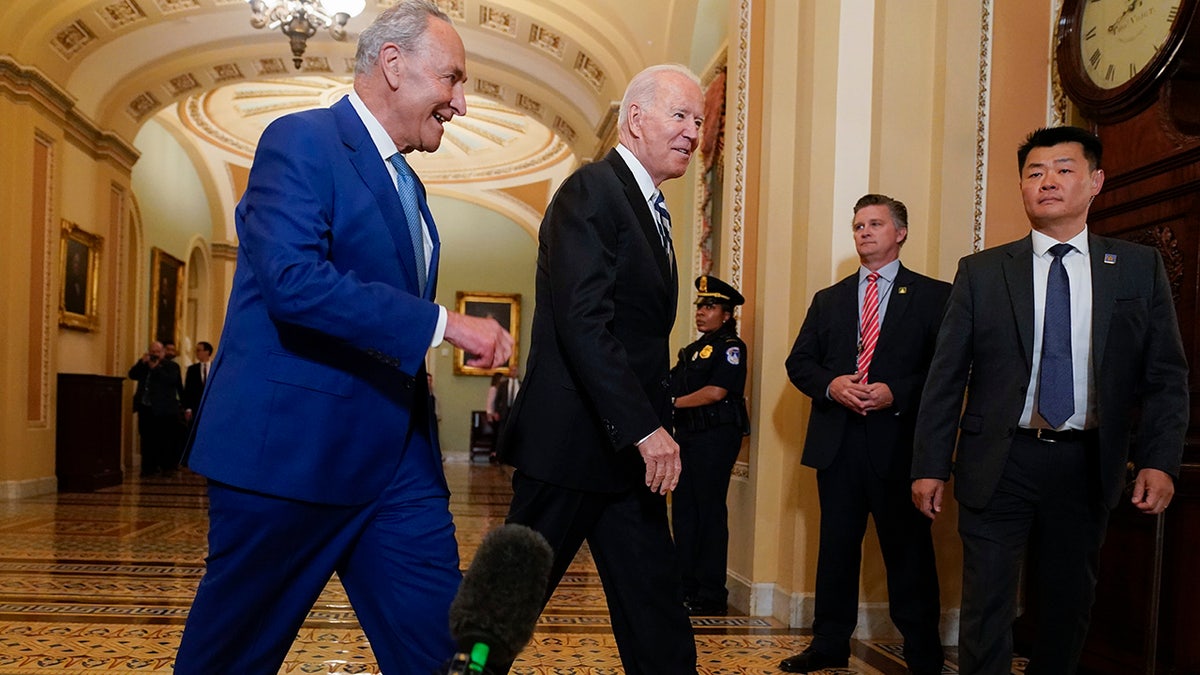Byron York: Democrats will use 'any argument at hand' to kill filibuster
'Special Report' panel members react to AG Merrick Garland's call for accountability for all Jan. 6 perpetrators.
Senate Majority Leader Chuck Schumer, D-N.Y., is leading an effort in the Senate to peel back the filibuster after fiercely defending the 60-vote rule as a way to bring "balance" to the upper chamber.
Schumer in 2003 – when the Senate had a very narrow GOP majority – gave a spirited defense of Democrats using the filibuster on President George W. Bush's judicial nominees. He made the case that since Bush didn't win in a landslide, the actions of the Senate should reflect the ideological middle of the country.
"The bottom line is this. We are defending the Constitution, we are saying there should be some balance," Schumer, D-N.Y., said in a 2003 floor speech. "President Bush didn’t win by a landslide. This Senate is not 62 to 38, or 70 to 30. This country is narrowly divided, and that means when laws are made they move to the middle."
He criticized the Republicans for trying to bend the rules to get the result they want. Schumer said the minority party's role in filibustering is nothing new, but "what’s new is the view on the other side that if they don’t get their whole way they want to change the rules."
CHUCK SCHUMER ON THE FILIBUSTER IN 2017: IF YOU CAN'T GET 60 VOTES, 'YOU SHOULDN'T CHANGE THE RULES'
His comments came as Senate Republicans were frustrated with Democrats for filibustering Bush's judicial nominees.
"What my colleagues have done is taken the result they want … and then come up with an argument that all of a sudden filibusters are bad," Schumer said.

President Biden walks with Senate Majority Leader Chuck Schumer, D-N.Y., at the Capitol in Washington, Wednesday, July 14th, 2021, as he arrives to discuss the latest progress on his infrastructure agenda. (AP Photo/Andrew Harnik)
It's the latest example of Schumer's defense of the filibuster when Democrats were in the minority and wanted to stall the GOP agenda and judicial appointments.
Schumer fought hard against Kentucky Sen. Mitch McConnell's decision to roll back the filibuster to approve President Trump's Supreme Court nominees, saying at the time if a "nominee doesn't get 60 votes, you shouldn't change the rules- you should change the nominee," Schumer told NBC's Chuck Todd at the time.
SCHUMER TARGETS FILIBUSTER REFORM TO PASS VOTING RIGHTS LEGISLATION
Also in 2017, Schumer took to the Senate floor to say there should be a "firewall" around the legislative filibuster.
"Let us go no further down this road," Schumer said. "I hope the Republican Leader and I can, in the coming months, find a way to build a firewall around the legislative filibuster, which is the most important distinction between the Senate and the House."
Now, however, Schumer is leading a charge in the Senate to take a vote on rolling back the legislative filibuster by Jan. 17 – the Martin Luther King Jr. federal holiday. Schumer wants a carve out to the filibuster to pass voting rights reforms by a simple majority that would set national standards for running elections.
Republicans are squarely against changing the rules for voting reforms they view as radical and a federal overreach.
MCCONNELL SLAMS SENATE DEMOCRATS FOR INVOKING JAN 6 TO PUSH FILIBUSTER CHANGES: 'SURREAL'
"The so-called voting rights acts they are pushing are a liberal Democrat federal takeover of our election systems which constitutionally reside with the states," Sen. Lindsey Graham, R-S.C., said on Twitter Thursday.
Schumer's office pointed to an interview he gave Monday with MSNBC's Joy Reid to explain his evolving opinion on the filibuster.

President Biden arrives with House Speaker Nancy Pelosi of California, and Senate Majority Leader Chuck Schumer of New York, on his way to speak from Statuary Hall at the U.S. Capitol to mark the one year anniversary of the Jan. 6 riot at the Capitol by supporters loyal to then-President Donald Trump, Thursday, Jan. 6, 2022, in Washington. (Bill Clark/Pool via AP)
"Even a paragon who believed in the Senate rules, Robert C. Byrd, changed the rules nine times and he said, and I think I have his quote pretty accurately here, ‘When circumstances change, the rules have to change,'" Schumer told the ReidOut.
"Well, let me tell you something: circumstances have changed dramatically with Donald Trump, the Big Lie, the violence of January 6th and all the efforts to take away voting rights," Schumer continued, referring to Trump's repeated false claims that he won the 2020 election instead of President Biden.
CLICK HERE FOR THE FOX NEWS APP
And last year, Schumer said Democrats were justified in using the filibuster against Trump's agenda and argued what Republicans are doing now with stalling President Biden's agenda is different.
"The big difference is that we were always willing to negotiate in a bipartisan way," Schumer told reporters at a press conference in March 2021. "Mitch McConnell isn’t. The bills he puts on the floor, even when he calls them bipartisan, aren’t."
Fox News' Joseph Wulfsohn contributed to this report.














































